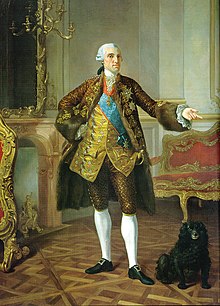Philip, Duke of Parma
| Philip I | |
|---|---|
 | |
| Duke of Parma, Piacenza and Guastalla | |
| Reign | 18 October 1748 – 18 July 1765 |
| Predecessor | Maria Theresa |
| Successor | Ferdinand |
| Born | 15 March 1720 Royal Alcazar, Madrid, Spain |
| Died | 18 July 1765 (aged 45) Alessandria, Italy |
| Spouse | Louise Élisabeth of France |
| Issue | Isabella, Archduchess of Austria Ferdinand, Duke of Parma Maria Luisa, Queen of Spain |
| House | House of Bourbon-Parma |
| Father | Philip V of Spain |
| Mother | Elisabeth Farnese |
Philip of Spain (15 March 1720 – 18 July 1765) was Duke of Parma from 1748 to 1765. He founded the House of Bourbon-Parma (a.k.a. the Bourbons of Parma), a cadet line of the Spanish branch of the dynasty. He was a son-in-law of Louis XV.
Life
Born at the Royal Alcazar in Madrid, he was the third child and second son of Philip V of Spain and his wife, Elisabeth Farnese.
He was raised in Madrid and as a child showed more interest in art than in politics. He was also the 12th Count of Chinchón and Grandee of Spain First Class with a coat of arms of Bourbon after the alienation with royal authorization in 1738 of the 11th Count of Chinchón, Don Jose Sforza-Cesarini, Duke of Canzano, a title he later ceded to his brother Louis in 1754.
His mother came from the family of Farnese, which had ruled the Duchy of Parma, Piacenza and Guastalla for many generations. The duchy had been ruled between 1731 and 1736 by his elder brother Charles, but was exchanged with Austria for The Two Sicilies after the War of Polish Succession. Twelve years later, in the Treaty of Aix-la-Chapelle (1748), Austria lost the duchy and Philip became the new duke, founding the House of Bourbon-Parma.
As part of the Treaty of Versailles (1757) between Austria and France, it was intended that Phillip would become king of the Southern Netherlands in a deal that would see French troops occupy key positions in the country – however this arrangement was repudiated by the subsequent Third Treaty of Versailles and Phillip continued in Parma.
The Duchy of Parma was ruined by many years of warfare, and in 1759 Philip named the able Frenchman Guillaume du Tillot as his minister to restore the economy. Philip was an enlightened ruler who stimulated education and philosophy, attracting personalities like Étienne Bonnot de Condillac.
Marriage
Philip married his first cousin once removed Princess Louise Élisabeth of France in Alcalá de Henares, Spain on 25 October 1739. They had the following children:
- Isabella Luisa Antonietta Ferdinanda Giuseppina Saveria Dominica Giovanna of Parma (31 December 1741 – 27 November 1763) – she married Marie Antoinette's older brother, the Austrian emperor, Joseph II. She had issue, but all her children died in childhood.
- Ferdinando Maria Filippo Lodovico Sebastiano Francesco Giacomo of Parma (20 January 1751 – 9 October 1802), ) – he succeeded his father as Duke of Parma in 1765 and married his older sister's sister-in-law, the Archduchess Maria Amalia of Austria. He left issue.
- Luisa Maria Teresa Ana of Parma (9 December 1751 – 2 January 1819) – she was known as Maria Luisa. She married her cousin, the Infante Carlos of Spain, and later became the Queen Consort of Spain. She left issue.
Philip died unexpectedly on 18 July 1765 in Alessandria, Italy, after having accompanied his daughter Maria Luisa on her way to Genoa, where she sailed for Spain to marry Infante Charles. Through Philip's daughter Maria Luisa, he is an ancestor of the Bourbons of Spain, the Bourbons of the Two Sicilies, and the House of Orléans.
Ancestors
Heraldry

|
 |
| Coat of Arms as Duke of Parma, Piacenza and Guastalla[2] |
Titles and Styles
- 15 March 1720 – 1749 His Royal Highness Don Felipe, Infante of Spain[3]
- 1749 – 18 July 1765 His Royal Highness the Duke of Parma, Piacenza and Guastalla
References
- ^ Balechou, Jean Joseph. "Don Philippe, Infant d'Espagne" (in Portuguese). National Library of Portugal. Retrieved 18 March 2013.
- ^ "Parma, Fernando I de Borbón, Duque de (1751-1802)". Ex-Libris Database (in Spanish). Royal Library of Spain. Retrieved 18 March 2013.
- ^ http://www.heraldica.org/topics/france/frroyal.htm#sang Style of HRH and further information on Princes of the Blood
- House of Bourbon-Parma
- Dukes of Parma
- Dukes of Guastalla
- Princes of Parma and Piacenza
- Spanish infantes
- Knights of the Golden Fleece
- 18th-century Spanish people
- Spanish generals
- 1720 births
- 1765 deaths
- House of Bourbon
- People of the War of the Austrian Succession
- Burials at the Sanctuary of Santa Maria della Steccata, Parma
- Grandees of Spain

